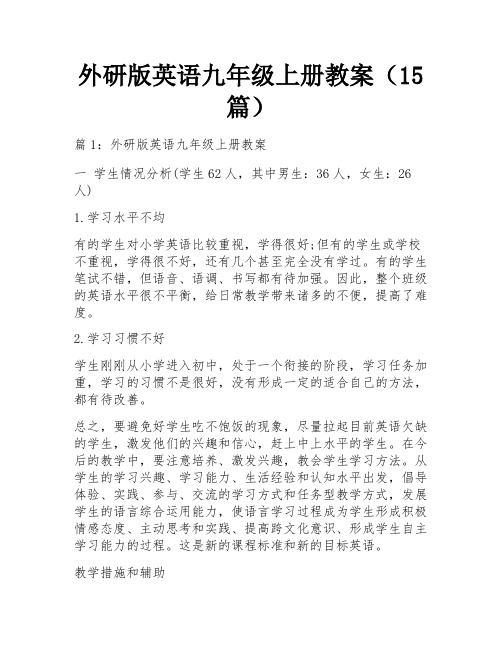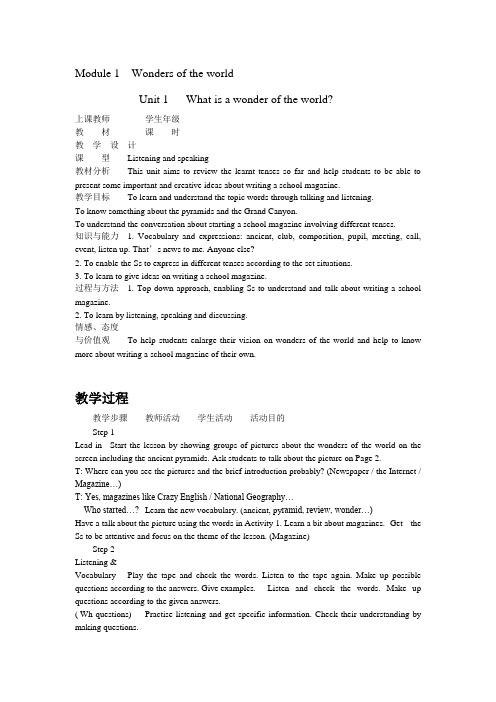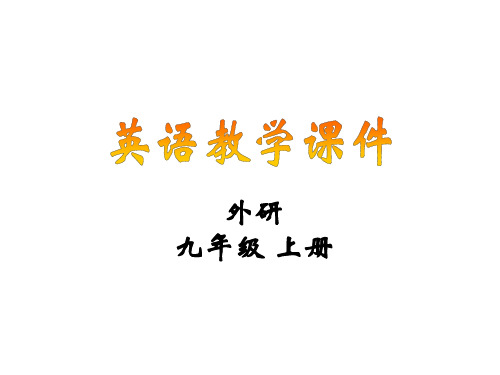外研社九年级(上)
外研版英语九年级上册Module4-6全部词汇详解课件(95页)可编辑全文

讲解:相当于 anyone。多用在疑问句、 否定句或条件状语从句中。 (anybody 作主语时,谓语动词 要用第三人称单数形式)
pron. 任何人
例句: Is there anybody who can tell a fairy tale?
拓展:miss 的其他用法: (1) vt. 怀念;思念 I do miss the children. (2) vt. 错过;没赶上;未击中
It’s the chance of a lifetime. You shouldn’t miss it.
(3) n.小姐;女士
Miss Zhang is our Chinese teacher. (miss 在此种用法中,首字母须大写, 且常用于未婚女士的姓氏前)
拓展: 反义词:downstairs adj. 位于 楼下的 adv. 往楼下;在楼下
n. 展览;展览会
例句: The photographs will be on exhibition until the end of the month.
n. 规则;法则
短语: break the rules 违反规定 follow the rules 遵守规定 例句: You shouldn’t break the
Module 4 Home alone
Unit 2 词汇课件
外研·九年级上册
v. 管理;支配
例句:The 30 years old man manages a big company by himself. 拓展: 1. v. 做成;(尤指)设法完成 2. manager n. 经理;管理者 例句: I found the manager and told him about the clerk’s kindness and patience.
外研版英语九年级上册教案(15篇)

外研版英语九年级上册教案(15篇)篇1:外研版英语九年级上册教案一学生情况分析(学生62人,其中男生:36人,女生:26 人)1.学习水平不均有的学生对小学英语比较重视,学得很好;但有的学生或学校不重视,学得很不好,还有几个甚至完全没有学过。
有的学生笔试不错,但语音、语调、书写都有待加强。
因此,整个班级的英语水平很不平衡,给日常教学带来诸多的不便,提高了难度。
2.学习习惯不好学生刚刚从小学进入初中,处于一个衔接的阶段,学习任务加重,学习的习惯不是很好,没有形成一定的适合自己的方法,都有待改善。
总之,要避免好学生吃不饱饭的现象,尽量拉起目前英语欠缺的学生,激发他们的兴趣和信心,赶上中上水平的学生。
在今后的教学中,要注意培养、激发兴趣,教会学生学习方法。
从学生的学习兴趣、学习能力、生活经验和认知水平出发,倡导体验、实践、参与、交流的学习方式和任务型教学方式,发展学生的语言综合运用能力,使语言学习过程成为学生形成积极情感态度、主动思考和实践、提高跨文化意识、形成学生自主学习能力的过程。
这是新的课程标准和新的目标英语。
教学措施和辅助二课时总安排总共100课时:授课课时复习课时测试课时机动课时三.教材总体目标、单元要求及重难点The goal:The goal of Go for it is to make language a step-by-step progression that builds confidence and leads to open-ended activities where students can actively relate learning to their personal lives.Go For It! 是以《英语课程标准》为依据,以学生的英语语言综合运用能力为目标。
不仅以语言知识、语言技能为重点,而且更注重学生的学习策略、情感态度和文化意识。
教学内容的处理和取舍灵活开放,只要教师从学生的实际水平和语言能力出发,任何教学内容的调整或取舍,任何教学步骤的安排都是可行的。
外研版九年级上册英语全册教案

Module 1 Wonders of the worldUnit 1 What is a wonder of the world?上课教师学生年级教材课时教学设计课型Listening and speaking教材分析This unit aims to review the learnt tenses so far and help students to be able to present some important and creative ideas about writing a school magazine.教学目标To learn and understand the topic words through talking and listening.To know something about the pyramids and the Grand Canyon.To understand the conversation about starting a school magazine involving different tenses.知识与能力 1. Vocabulary and expressions: ancient, club, composition, pupil, meeting, call, event, listen up. That’s news to me. Anyone else?2. To enable the Ss to express in different tenses according to the set situations.3. To learn to give ideas on writing a school magazine.过程与方法 1. Top-down approach, enabling Ss to understand and talk about writing a school magazine.2. To learn by listening, speaking and discussing.情感、态度与价值观To help students enlarge their vision on wonders of the world and help to know more about writing a school magazine of their own.教学过程教学步骤教师活动学生活动活动目的Step 1Lead-in Start the lesson by showing groups of pictures about the wonders of the world on the screen including the ancient pyramids. Ask students to talk about the picture on Page 2.T: Where can you see the pictures and the brief introduction probably? (Newspaper / the Internet / Magazine…)T: Yes, magazines like Crazy English / National Geography…Who started…?Learn the new vocabulary. (ancient, py ramid, review, wonder…)Have a talk about the picture using the words in Activity 1. Learn a bit about magazines. Get the Ss to be attentive and focus on the theme of the lesson. (Magazine)Step 2Listening &Vocabulary Play the tape and check the words. Listen to the tape again. Make up possible questions according to the answers. Give examples. Listen and check the words. Make up questions according to the given answers.( Wh-questions) Practise listening and get specific information. Check their understanding by making questions.Step 3.Listen &read Play the tape for the 1st time. Ask Ss questions.T: What are the children doing?Is there a school magazine inDa Ming’s school?Listen to the tape and get the answers. Listen to get a general idea for the 1st time.Play the tape again and ask students to decide T OR F.①Crazy feet is a band.②Becky Wang started a school magazine.③Da Ming watched the interview on TV yesterday④Tony is writing a composition. Listen more carefully for the 2nd time. Decide whether they are true or false. Check the answers with the class. Listen for the specific information and understand the details of the conversation.Step 4.Read Play the tape again and get Ss to practise the conversation. Check the language points. Focus on everyday English and useful expressions.(Listen up, Anyone else? do some review, do an interview, on=about, get better grades)Get Ss to make a list of the articles in magazines.Check the answers in Activity 4. Read theconversation aloud, and read in role. Answer the questions in Activity 4. Practise reading and go over how to give suggestions when in discussion. Learn more about writing a school magazine.Step 5.Pair work Go through the five questions and highlight the key words. Ask for more answers on Question 3. Ss take turns to answer the questions. Consolidate the key words and transit to the next step by Question 3.Step 6.Discussion Tell the Ss:If your school decides to start a magazine, what are you going to write about? And why? They can make up lists and take Activity 3 as an example.Report their discussion. Work out the lists and talk about their plans to write the magazine. Beginning: Our school will start a magazine. What articles are you going to write... Learn to discuss in the way as the children do. Check Ss’ creativity.作业布置Collect information about the seven wonders of the world. (Pictures and brief introductions)板书设计Unit 1 What is a wonder of the world?school magazine That’s news to me!a wonder What’s it about?ancient pyramids listen upwrite a composition Any more ideas?/ Anyone else?do some reviews about… on=aboutdo an interview withUnit 2 Iwas on the edge of the Grand Canyon.上课教师学生年级教材课时教学设计课型Reading and writing教材分析By example this unit presents a good way to describe what one sees and feels after a journey. It can help students to know more about the Grand Canyon, and inspire Ss to love and explore the natural wonders.教学目标To get information from the reading material about the Grand Canyon;To learn the way of writing about what you see and your feelings when traveling;知识与能力 1. Vocabulary and expressions: waterfall, stranger, rock, ground, canyon, reply, rise, face, get out of, look over, disappear into, look (across) to…light-dark, clear, huge, beside, below, at the bottom of, reach the top. …too…to…2. To enable the Ss to express in different tenses according to the set situations.3. To love the wonders of the natural world and give facts and opinions.过程方法 1. Interactive approach.2. To improve Ss reading skills and get them to talk and practise writing by imitating.情感、态度与价值观To help students enlarge their vision on wonders of the world and help to write a description of a wonder that they have seen or visited.教学过程教学步骤教师活动学生活动活动目的Step 1Lead-in Ask Ss to show information about the seven natural wonders. (The teacher can get the related pictures ready beforehand)Present words in Activity 1. Talk and give facts about the wonders. Encourage Ss to describe withthe words given. Check up Ss’ homework and start the new topic.(Wonders)Step 2.Ask andanswer Ask Ss to make questions about facts of the natural wonders.Demonstrate and get Ss to follow. Ask andanswer.How tall/deep…is it?It’s…meters tall/deep.Practise asking about detailed information and learn the sentence pattern.Step 3.Read(Skimming)Tell Ss to read the passage in Activity 2. Find out the name of the wonder and its facts.T: Where did the writer visit?How deep/wide/long is it? Read thepassage andanswer thequestions. Find out the facts and write them down in Activity 5. Practise reading skills and get specific information.Step 4Readand match Play the tape and get Ss to follow silently. Find out the main idea of each paragraph. Present the five topic sentences on the screen (Bb).A. The writer arrived there on the rainymorning;B. The first impression/sight of theGrand Canyon.C. The Grand Canyon is the greatestwonder in his opinion.D. Details about the Grand Canyon.E. After minutes’ walk, he came to it.Ss follow the lines and match thetopic sentences tothe paragraphs.(or they canconclude the main idea by themselves if possible) R ead for the main idea of each paragraph. Learn to sum up and help to understand the whole passage.Step 5Read aloudGet Ss to read aloud after the tape and find the details about the trip.①When did he get to the GrandCanyon?②Why was there nothing to see?③Where was he facing on the edge ofthe Grand Canyon?④How did he feel about the Canyon? Read aloud and answer questions in Activity 3. Ask for help if they have any problems. Practise reading and learn about the details, check their understanding.Step 6.Focus Now get Ss’ attention to those phrasal verbs and prepositional phrases. Try to check by a gap-filling exercise.(get out of, go through, look over, fall away, on the edge of, look down/across to, at the bottom of,disappear into, ask oneself ) Learn the verbs and phrases. Practising usingthem with thehelp of thegap-filling. Focus on the phrasal verbs and prepositions.Step 7.Match Activity 4Ask Ss to find these words in the passage and guess their meaning within the sentence.Underline thewords and match the Englishmeaning. Practise guessing the meaning of words in the context.Step 8.Writing Tell Ss to imagine they have seen (some of them did see) one of the wonders of the world. Write sentences describing how they felt. Remind them of the four keywords: saw, size, happened, felt.First get them to work in pairs and then report the sentences or passage if possible. Write sentences according to the given beginning. Report theiranswers and tryto make theminto a passage. Practise writing and using the language on the basis of imaging and personal experience.作业布置Finish writing the description of one of the wonders of the world, trying to collect some details and take the text as a model.板书设计Unit 2 I was on the edge of the Grand CanyonThe seven natural wonders of the worldHow tall/wide/deep is it? It’s…tall/wide/tall.get out of on the edge of ask oneselfgo through look down/across to huge=very very biglook over at the bottom of the greatest wonderfall away disappear intoUnit 3 Language in use上课教师学生年级教材课时教学设计课型Revision and application教材分析This unit serves to give a review and summary towards the language points learnt in U1&.2.And it helps to clarify the exact differences among tenses.教学目标To review and check the words learned in this module;To summarise and consolidate tenses learnt before;知识与能力 1. Vocabulary and expressions: height, lift, view, attract, description, location, design2. To enable the Ss to differ the tenses learned in situations.3. To make a poster of a wonder of the world/ one’s hometown.过程方法 1. Formal and interactive practice, task-based.2. Comprehensive ways of practising and consolidating.情感、态度与价值观To help students enlarge their vision on wonders of the world;To make a poster of a wonder of the world or his hometown and help to love one’s motherland.教学步骤教师活动学生活动活动目的教学过程Step 1Revision Ask Ss to watch and listen to the MV Chinese by Andy Lau. Get them to find out the wonder in it.Encourage Ss to describe what they see in it , e.g.The Great Wall is a great wonder.Andy Lau went to the Great Wall.He was singing on it.He has sung many popular songs.…Watch and talk about things appear in the MV. Learn to tell the differences amongthe tenses. Help to establish the concepts of tenses in situations.Step 2.Grammar focus 1. Read through the sentences in the box with the whole class. Call back ideas about the structure highlighted from the students.2. Give hand-out to Ss and ask them to match the exact meaning with the corresponding sentence. (Activity 1)Check the answers right after that. 1. Read aloud the seven sentences. And tell the making-up of each tense.2. Read through the 5 pairs of sentences in different tenses and match. Practise telling the differences and meanings.Step 3.Writing1. Go back to the picture of the Great Wall. Give examples by matching the three parts.The Great Wall + is + about 6,700 km long.Give Ss tips on how to decide.2. Encourage Ss to observe and decide the forms of verbs in different tenses. 1. Observe thesubjects and theadverbial or even the phrasal verbs. Match the three parts to make possiblesentences.2. Read through the uncompleted passage and try to give the correct forms of verbs in the situations. Learn to observe and practise language in different tenses.Step 4Speaking 1. Show up the photo of visiting the Great Wall. Get Ss to ask the teacher questions in Activity 4. (Example)Get Ss to work in pairs, and ask and answer the questions.2. Present wonders in the local area.Get Ss to talk about them. 1. Ss follow theteacher and make up their ownconversations.Perform in front of the class.2. Learn the example in Activity 5 and make a similar introduction to the wonders in local area.Practise speaking and enable Ss to use the language and understand its meaning.Step 5VocabularyGame Present nine pictures about wonders of the world, each of which links an exercise in Activity 6/8. Get Ss to finish them first and check in forms of game. Elaborate on the Pyramids in Egypt. (More related photos) Finish the multiple- choices exercises and choose the pictures they’re interested in to check the answers. With the help of games, Ss can review the phrasal verbs and concepts of tenses.Step 6.Listening Present the three photos in Activity 7Ask about facts about any one of them. Play the tape for Ss to learn more. Listen and match the notes with the photos.Check the answers after listening and report about the three wonders with the help of the table.Learn more about the three wonders, practising describing.Step 7.Around the world Get Ss to look at the picture and read silently through the introduction. Give questions to check theirunderstanding. Read and decide, trying to grasp the main information. Learn about another wonder of the world.Step 8.Module task Tell Ss to work in groups of 4. Read through the instructions. Help them to decide what to write about.Hold up a show-and-tell session where Ss can display and discuss. Work in groups of 4 and write about one wonder they like. Collect sufficient information and make the poster. Take part in the show-and-tell session.Take this task as an extensive learning activity to get Ss to learn more about the wonders.作业布置Finish off the poster after class and get ready for the show at the back wall of the classroom. Prepare the show-and-tell session in groups of four.板书设计Unit 3 Language in useStructures of different tenses ancientThe Great Wall is a wonder… modern wondersAndy Lau went to the Great Wall. naturalHe was singing on it height—What’s the height of…?We are listening to him now. on the journey of…He has sung many pop songs. because / because ofHe will visit it some other day.Module 2 Great books一、教学内容分析本模块的话题是谈论书、作家、思想家、戏剧、电影、诗歌等。
外研社英语九年级上M3U1课件

2. …and then attended university abroad. 之后(她)去国外上大学。 attend 动词,常用的意思: (1) 出席、参加 (2) 上(学) Only 20 people attended the meeting yesterday. All children between the age of 5 and 16 must attend school.
P18 Task 2 3 Read the passage and complete the table.
Facts about Deng Yaping
started playing table When she was five, she ____________________ tennis _________________ stopped playing When she was she ____________________ twenty-four, study at After she stopped she began to ____________ Tsinghua University in playing, _________________ Beijing. completed her doctor’s After seven years’ she ____________________ study abroad, _______________________ degree at Cambridge University
P19
Task 3
4 Complete the sentences so that they are true for Deng Yaping. cleverer than 1. She says she is not ______________ anyone else _____________________. strong will 2. She has a very _________________. 3. She helped ____________________ make the Beijing _________________. Olympics a victory never give 4. Whatever she does, she __________ up ___________.
外研版九年级英语上册全一册教案设计

外研版九年级英语上册全一册教案设计Module 1 Wonders of the worldUnit 1 It's more than 2,000 years old.【教学目标】【教学思路】本单元的教学内容是第一模块中的第一单元,通过提供必要的图片、背景等为学生创造一个全新的语言氛围。
首先,学生们刚刚假期归来,通过询问他们“假期去过哪里?”“在那儿做过什么?”和“新学期的打算是什么?”导入新课。
以学生感兴趣的话题开篇,重点在于培养学生的学习兴趣。
因此,教师并未对书上的图片进行讨论,而是从自然景观和人造景观谈起,帮助学生为第一部分的听力做了充分的准备,使得他们在听时能快速地抓住细节成为可能。
【教学准备】黑板,录音机,单词卡片,教学图片,多媒体,配套的资料,配套的巩固练习册等。
【教学过程】Step 1 Warming up & Leading in1.师生问候。
2.师生对话,谈论假期生活。
如:新学期开始,学生又见面了。
教师给几分钟的时间让他们谈论假期的生活和对新学期的展望。
T:Boys and girls,new term is coming.What did you do during the summer vacation?Where did you go?Let's talk about them.The teacher asks some students to talk about their summer vacations and gives some help if necessary.T:OK.Everyone had a good time on vacation.What are your new term's resolutions?(引导学生回答:I'm going to get good grades.)活动小结:新学期开始,教师通过让学生自由谈论假期生活和新学期的计划导入新课,活跃了课堂气氛,也能让学生比较迅速地进入到课堂状态中,调动他们的学习积极性,从而消除了第一节课的紧张感。
外研社英语九年级上M1U2课件ppt

为深入学习习近平新时代中国特色社 会主义 思想和 党的十 九大精 神,贯彻 全国教 育大会 精神,充 分发挥 中小学 图书室 育人功 能
Some facts about the Grand Canyon.
* location: Arizona, USA * 446 km long 16 km wide (average) 1N,6o0w0 mletd’esepe(najvoeyraagev)ideo about * iotnse foaf nthteasstevicenvwieown.ders of the natural world * The Colorado River runs through the Grand Canyon. * The rock found at the bottom of the Grand Canyon is around 2 billion years old.
How wide How long
about fifteen miles more than 200 miles
P5
为深入学习习近平新时代中国特色社 会主义 思想和 党的十 九大精 神,贯彻 全国教 育大会 精神,充 分发挥 中小学 图书室 育人功 能
Task 3
3 Read the passage again and choose the
Words and expressions
below prep. 在……下面;在…… 以下
shine v. 照耀 sign n. 迹象;标志;招牌 silent adj. 寂静的 silver adj. 银灰色的;银制的 sky n. 天;天空 grey adj. 灰色的;(天气)阴沉的
外研版九年级上册英语课文翻译

外研版九年级上册英语课文翻译Module 1 unit 1托尼:让我们给世界奇观栏目打电话并且加入这个讨论。
我认为自然奇观比人造奇观更有趣。
并且我认为the Giant’s Causeway 是最奇妙的自然奇观。
玲玲:Hmm, 我从来没见过它,,所以我不确定我同意你。
你为什么喜欢它,托尼?托尼:好的,我两年前参观过巨人之路。
它是巨大的。
大约有40,000块岩石,其中大多数有六个面。
它在北爱尔兰东海岸绵延数百米。
玲玲:那听起来太棒了,虽然我认为在非洲的Victoria Fall 是甚至更加奇妙。
它大约1700米宽和100米高。
你能够从几公里远的地方听到大声的噪音。
贝蒂:Wow, 那太巨大了!但是在我看来,人造奇观比自然奇观更加激动人心。
看看Terracotta Army. 它两千多年了。
大明:我同意你,贝蒂。
并且我认为the Three Gorges Dam 也是奇妙的。
它大约2300米长,185米高并且在顶端15米宽。
在中国它为数百万人发电。
贝蒂:现在,谁想第一个打电话?Module 1 unit 2自然界的伟大的奇观当我到达的时候,是一大早并且天正下着雨。
我往东方看去---天空正变成灰色。
我走下车,穿过一道门并且沿着一条黑暗的小路走。
什么也看不到,但是我知道它就在那里。
大约走了一英里之后,一个陌生人在小路边出现了。
“我走了正确的路吗?”我问。
他知道我将要去哪里。
“是的”,他回答,“你将在五分钟后到达那里。
”最后,我来到一些岩石旁并且停下来。
我仔细从上方看去,但是它是寂静的并且没有它的标志。
突然,雨停了并且云散了。
太阳从我身后升起并且照耀着岩石。
在我的下方很远,地面下沉并且到一条河里。
我正欣赏着自然界的奇观之一------大峡谷。
我向下看Colorado River,在我下方将近一英里的银色小溪。
如果你把世界上最高的两座建筑物叠加起来放在大峡谷的底部,它们仍然不能到达顶部。
然后我向大峡谷的另一侧看去。
外研版英语九年级上册知识点总结(精华版)

九年级英语上册知识点总结Module1 Wonders of the world一、重点短语1.wonders of the world世界奇观2.natural wonders自然奇观3.join in = take part in参加;加入(活动)4.agree with sb.同意某人的看法5. agree to do sth.同意做某事6.in one’s opinion依某人看来;按某人的意见7.more than = over多于,超过8. millions of数百万的;数以百万计的9.produce electricity供电10.would like to do sth. = want to do sth.想做某事11.get out of...从....出来12.become grey变成灰色13.look across眺望, 向对面看14.look down to俯视;向下看15.go down下去;下沉;坠落16.look over从(某物上面)看过去:仔细检查17. go through穿过,经历,经受,浏览18.at the bottom of在.....的底部19.on both sides在两边20.in height高度;在高度上21. do an interview with sb.采访某人22.draw a picture of画一副......的图画23.fall away突然向下倾斜24.wait for等候25.dozens of许多26.be famous for以.......而闻名二、固定结构1. sb./sth agrees with sth.某人/某物适应(食物、气候)/符合某物,I don't think the food here agrees with me. 我觉得这里的食物不对我的胃口His explanation agrees with the facts of the situation.他的解释与实情相符。
- 1、下载文档前请自行甄别文档内容的完整性,平台不提供额外的编辑、内容补充、找答案等附加服务。
- 2、"仅部分预览"的文档,不可在线预览部分如存在完整性等问题,可反馈申请退款(可完整预览的文档不适用该条件!)。
- 3、如文档侵犯您的权益,请联系客服反馈,我们会尽快为您处理(人工客服工作时间:9:00-18:30)。
九年年级(上)备注:1-熟词绿⾊色;2-夹⽣生词-⻩黄⾊色;3-陌⽣生词-红⾊色版本:时间:单元序单词⾳音标中⽂文1-熟词2-夹⽣生词3-陌⽣生词11man-made['mæn'med]adj.⼈人造的12natural['nætʃrəl]adj.⼤大⾃自然的13wonder['wʌndə]n.奇观,奇迹14discussion[dɪ'skʌʃ(ə)n]n.讨论,商讨15eastern['iːst(ə)n]adj.在东边的,来⾃自东边的16though[ðəʊ]conj.虽然,但是17loud[laʊd]adj.(声⾳音)响亮的18wow[waʊ]int.呀,哇(⽤用于表示惊讶或赞叹)19opinion[ə'pɪnjən]n.看法,主张110in one's opinion按某⼈人的意⻅见,据某⼈人看来按某⼈人的意⻅见,据某⼈人看来111more than超过超过112electricity[ɪ,lek'trɪsəti]n.电113millions of⼤大量量的,⽆无数的⼤大量量的,⽆无数的114below[bɪ'ləʊ]prep.在下⾯面,在……以下115shine (shone /shined) [ʃaɪn]v.照耀116sign[saɪn]n.迹象,标志,招牌117silent['saɪlənt]adj.寂静的118silver['sɪlvɚ]adj.银灰⾊色的,银制的119sky[skaɪ]n.天,天空120grey[greɪ]adj.灰⾊色的,(天⽓气)阴沉的121go through穿过穿过122beside[bɪ'said]prep.在……旁边,在……附近123reply[rɪ'plai]v.回答,答复124clear[klɪə]v.(烟雾等)开始消失125fall away突然向下倾斜突然向下倾斜126stream[strim]n.⼩小河,⼩小溪127nearly['nɪəlɪ]adv.⼏几乎,差不不多128on top of在……上⾯面,盖住在……上⾯面,盖住129canyon['kænjən]n.峡⾕谷130remain[rɪ'meɪn]v.逗留留,留留下131by[baɪ]prep.在……旁边,靠近232found[faʊnd]v.创⽴立,创建233since then从那以后从那以后234flag[flæg]n.旗,旗帜235until[ən'tɪl]prep.&conj.直到……为⽌止236off[ɒf]adv.不不上课,休息,不不⼯工作237all kinds of各种各样的各种各样的238vacation[və'keiʃn]n.假期,假⽇日239take a vacation去度假去度假240season['siːzn]n.度假旺季,节期241kid[kɪd]n.⼩小孩242have fun玩得⾼高兴,有乐趣玩得⾼高兴,有乐趣243band[bænd]n.乐队244UK英国英国245as soon as⼀一……就……⼀一……就……246fourth[fɔrθ]num.第四247sixth[sɪksθ]num.第六248seventh['sevnθ]num.第七249eighth[eθ]num.第⼋八250ninth['naɪnθ]num.第九251tenth[tenθ]num.第⼗十252twelfth[twelfθ]num.第⼗十⼆二253twentieth[ˈtwentiəθ]num.第⼆二⼗十254among[ə'mʌŋ]prep.在……之中255speech[spiːtʃ]n.演说,讲演256pioneer[paɪə'nɪə]n.开拓拓者,先驱者257grow[grəʊ]v.种植,栽培(植物)258corn[kɔːn]n.⾕谷物,⽟玉⽶米259following['fɒləʊɪŋ]adj.接着的,接下来的260lay (laid, laid)摆放(餐桌)摆放(餐桌)261lay the table摆放餐桌摆放餐桌262over['əʊvə]adj.完了了的,结束的263dish[dɪʃ]n.盘,碟264parade[pə'reɪd]n.(庆祝)游⾏行行265ourselves[aʊə'selvz]pron.我们⾃自⼰己366including[ɪn'kluːdɪŋ]prep.包含,包括367medal['medl]n.奖牌,奖章368attend[ə'tend]v.上(学),出席,参加(事件或活动) 369abroad[ə'brɔːd]adv.在国外,到国外370once again再⼀一次再⼀一次371doctor['dɒktə]n.博⼠士372degree[dɪ'griː]n.课程,学位373whatever[wɒt'evə]pron.⽆无论什什么,不不管什什么374give up放弃(努⼒力力)放弃(努⼒力力)375amazing[ə'meɪzɪŋ]adj.惊⼈人的,极好的376will[wɪl]n.意志,决⼼心377victory['vɪktərɪ]n.成功,胜利利378simply['sɪmplɪ]adv.实在,的确379Canadian[kə'neɪdɪən]adj.加拿⼤大的,加拿⼤大⼈人的380sick[sɪk]adj.(感觉)不不适的,⽣生病的381soldier['səʊldʒə]n.军⼈人,⼠士兵382treat[triːt]v.医治,治疗383war[wɔː]n.战争384wound[wuːnd]n.伤,伤⼝口385die for为……⽽而死为……⽽而死386wounded['wuːndɪd]adj.受伤的387realise['rɪəlaɪz]v.了了解,意识到388dying['daɪɪŋ]adj.垂死的,即将死亡的389care[keə]n.照顾,照料料390take care of照顾,护理理照顾,护理理391tool[tuːl]n.⼯工具,器器械392invention[ɪn'venʃən]n.发明,发明物393at that time那时候那时候394on one's own独⾃自⼀一⼈人独⾃自⼀一⼈人395useful['juːsfʊl]adj.有⽤用的,有益的396rest[rest]v.休息,睡眠397himself[hɪm'self]pron.他⾃自⼰己398manage['mænɪdʒ]v.做成,(尤指)设法完成399operation[ɒpə'reɪʃn]n.⼿手术3100continue[kən'tɪnjuː]v.(使)继续3101die of死于死于3102Canada['kænədə]n.加拿⼤大4103platform['plætfɔːm]n.(供上下⽕火⻋车⽤用的)⽉月台,站台4104meeting['miːtɪŋ]n.会议,集会4105miss[mɪs]v.未出席,未出现4106shut (shut, shut)关上,合上v.关上,合上4107lock[lɒk]v.锁,锁住4108simple['sɪmpl]adj.简单的,容易易的4109anybody['enɪbɒdɪ]pron.任何⼈人4110clock[klɒk]n.钟,时钟4111ring (rang, rung)鸣响,发出铃声v.鸣响,发出铃声4112passenger['pæsɪndʒə]n.乘客,旅客4113address[ə'dres]n.地址4114text[tekst]n.⽂文本,正⽂文4115text message短信短信4116couple['kʌpl]n.⼀一对,两个4117 a couple of两个两个4118actually['æktʃuəli]adv.事实上4119manage['mænɪdʒ]v.管理理,⽀支配4120unhappy[ʌn'hæpɪ]adj.不不⾼高兴的4121turn off关掉,关闭(设备)关掉,关闭(设备) 4122order['ɔːdə]n.命令,指示4123be worried about担⼼心担⼼心4124business[ˈbɪznəs]n.⼯工作4125on business出差出差4126sofa['səʊfə]n.(⻓长)沙发4127snack[snæk]n.点⼼心,⼩小吃4128midnight['mɪdnaɪt]n.午夜,⼦子夜4129wake up醒,醒来醒,醒来4130hand in提交,上交提交,上交4131empty['emptɪ]adj.空的4132unable[ʌn'eɪbl]adj.不不能做某事的4133all day long整天整天4134burn (burned /burnt)[bɜːn]v.(使)烧焦,(使)烤糊4135cup[kʌp]n.杯⼦子,⼀一杯饮料料4136task[tɑːsk]n.任务,⼯工作5137upstairs[ʌp'steəz]adj.&adv.位于楼上的;往楼上,在楼上5138exhibition[eksɪ'bɪʃn]n.展览,展览会5139rule[ruːl]n.规则,法则5140against the rules违反规定违反规定5141in trouble遇上麻烦,处于困境遇上麻烦,处于困境5142tail[teɪl]n.尾,尾巴5143rope[rəʊp]n.粗绳,绳索5144entry['entrɪ]n.进⼊入权,进⼊入许可5145No entry禁⽌止⼊入内禁⽌止⼊入内5146no good不不合适的,不不⽅方便便的不不合适的,不不⽅方便便的5147no wonder难怪,不不⾜足不不奇难怪,不不⾜足不不奇5148missing['mɪsɪŋ]adj.找不不到的,失踪的5149downstairs[daʊn'steəz]adj.&adv.位于楼下的;往楼下,在楼下5150punish['pʌnɪʃ]v.惩罚,惩处5151communications[kəmju:ni'keiʃnz]n.[复数]通信5152physics['fɪzɪks]n.物理理学5153chemistry['kemɪstrɪ]n.化学5154dig (dug, dug)挖掘,掘(洞洞)v.挖掘,掘(洞洞)5155coal[kəʊl]n.煤5156energy['enədʒɪ]n.能量量,能源5157X-ray['eks'reɪ]n.X射线,X光5158experiment[ɪk'sperɪmənt]n.实验5159sand[sænd]n.沙,沙⼦子5160control[kən'trəʊl]v.操作,操纵5161truck[trʌk]n.卡⻋车,货⻋车5162wheel[wiːl]n.轮⼦子,⻋车轮5163compare … with …⽐比较……与……⽐比较……与……5164of all ages所有年年龄段的所有年年龄段的5165whole[həʊl]adj.全部的,整个的6166deal[diːl]n.协议6167exam[ɪg'zæm]n.考试6168fail[feɪl]v.未能及格,未能达到6169guitar[gɪ'tɑː]n.吉他6170instrument['ɪnstrəmənt]n.乐器器,仪器器6171musical['mjuzɪkl]adj.⾳音乐的6172habit['hæbɪt]n.习惯6173get into the habit of养成……的习惯养成……的习惯6174schoolwork['sku:lwɜːk]n.学⽣生课业,功课6175volunteer[,vɒlən'tɪə]n.志愿者6176necessary['nesəs(ə)rɪ]adj.必要的,必需的6177shame[ʃeɪm]n.可惜,遗憾6178instead[ɪn'sted]adv.代替,⽽而不不是6179instead of⽽而不不是⽽而不不是6180community[kə'mjuːnɪtɪ]n.社区,社会6181knowledge['nɒlɪdʒ]n.知识,学识6182point[pɒɪnt]n.(试图表达的)观点,看法6183consider[kən'sɪdə]v.考虑,斟酌6184last word最后⼀一句句话,最终决定最后⼀一句句话,最终决定6185come round拜访(某⼈人的家)拜访(某⼈人的家) 6186reason['riːzn]n.原因,理理由6187try out试⽤用,试试⽤用,试6188angry['æŋgrɪ]adj.愤怒怒的,⽣生⽓气的6189no longer不不再不不再6190be angry with sb.⽣生某⼈人的⽓气⽣生某⼈人的⽓气6191repair[rɪ'peə]n. &v.修理理,修补6192truth[truːθ]n.事实,真相6193least[liːst]pron.最少,最⼩小6194at least⾄至少,起码⾄至少,起码6195honest['ɒnɪst]adj.诚实的,⽼老老实的6196apologise[ə'pɒlədʒaɪz]v.认错,道歉6197bill[bɪl]n.账单,账款6198pocket money零⽤用钱零⽤用钱7199discuss[dɪ'skʌʃ(ə)n]v.讨论,谈论7200thinker['θɪŋkɚ]n.思想家7201wise[waɪz]adj.有判断⼒力力的,明智的7202review[rɪ'vjuː]n.评论(⽂文章)7203influence['ɪnflʊəns]v.影响,作⽤用于7204sense[sens]n.道理理,意义,合理理性7205make sense易易理理解,合情理理,有意义易易理理解,合情理理,有意义7206by the way顺便便提⼀一下(⽤用于在交谈中插⼊入新话题、题外话或评论) 7207suppose[sə'pəʊz]v.猜想,推测,相信,认为7208well-known[,wel'nəʊn]adj.众所周知的,著名的7209adventure[əd'ventʃə]n.冒险(经历)7210get into trouble遇上麻烦遇上麻烦7211run away逃⾛走,逃跑逃⾛走,逃跑7212escape[ɪ'skeɪp]v.逃离,逃脱7213cave[keɪv]n.洞洞⽳穴7214dead[ded]adj.死的,去世的7215for a time⼀一⼩小段时间,⼀一度,⼀一时⼀一⼩小段时间,⼀一度,⼀一时7216neighbour['neɪbə]n.邻居7217funeral['fjuːnərəl]n.葬礼7218surprised[sɚ'praɪzd]adj.惊奇的,惊讶的7219alive[ə'laɪv]adj.活着的7220southern['sʌð(ə)n]adj.南⽅方的7221state[steɪt]n.州,邦7222pay for为……付出代价为……付出代价7223action['ækʃn]n.举⽌止,⾏行行为,情节7224everyday['evrɪdeɪ]adj.⽇日常的,普通的7225dialogue['daɪəlɒg]n.对话8226stand for是……的缩写,代表是……的缩写,代表8227memory['mem(ə)rɪ]n.记忆,回忆8228point[pɒɪnt]n.⽐比分8229decision[dɪ'sɪʒ(ə)n]n.决定8230excuse[ɪk'skjʊs]n.(辩解的)理理由,借⼝口8231noon[nuːn]n.中午,正午8232seat[siːt]n.座椅,座位8233no way决不不,不不可能决不不,不不可能8234fair[feə]adj.公平的,合理理的8235kick[kɪk]v.踢8236mad[mæd]adj.⽣生⽓气的,恼⽕火的8237sportsman['spɔːtsmən]n.(尤指职业的)运动员8238high jump跳⾼高跳⾼高8239ability[ə'bɪlɪtɪ]n.能⼒力力8240hurdling['hɝdlɪŋ]n.跨栏赛跑8241sportswoman['spɔːtswʊmən]n.(尤指职业的)⼥女女运动员8242race[reɪs]n.赛跑,⽐比赛8243record['rekɔːd]v. &n.记录;最佳记录8244method['meθəd]n.⽅方法,办法8245hurdles['hɜːdlz]n.跨栏赛跑8246Japan[dʒə'pæn]n.⽇日本8247break[breɪk]v.打破(纪录),打碎8248sportsperson[spɔːts-pɜːsn]n.运动员8249Asian['eiʃn]adj.亚洲的,亚洲⼈人的8250suffer['sʌfə]v.患有(疾病等),经受8251suffer from …受(某种病痛)折磨,因……⽽而受苦8252first place第⼀一名,冠军第⼀一名,冠军8253stop sb. (from)doing sth.阻⽌止某⼈人做某事阻⽌止某⼈人做某事8254courage['kʌrɪdʒ]n.勇⽓气,胆量量8255pride[praɪd]n.⾃自豪感,骄傲8256take pride in感到⾃自豪感到⾃自豪9257borrow['bɒrəʊ]v.借⼊入,借来9258put up张贴,公布张贴,公布9259website['websaɪt]n.⽹网站9260mail[meɪl]n.邮件,信件9261textbook['teks(t)bʊk]n.教科书,课本9262mainly['meɪnlɪ]adv.⼤大部分地,主要地9263thousands of好⼏几千,成千上万好⼏几千,成千上万9264page[peɪdʒ]n.⻚页,⼀一⻚页(纸)9265electronic[ɪlek'trɒnɪk]adj.电⼦子的9266technology[tek'nɒlədʒɪ]n.科技,技术9267powerful['paʊəfʊl]adj.有影响⼒力力的,能控制他⼈人的9268memory['mem(ə)rɪ]n.存储器器,存储量量9269full[fʊl]adj.満的,充满的9270fix[fɪks]v.修补,挽救9271instructions[ɪn'strʌkʃnz]n.[复数]说明书9272lend[lend]v.(把某物)借出,借给(某⼈人)9273properly['prɒpəlɪ]adv.合适地,正确地9274look through快速阅读,浏览9275printing['prɪntɪŋ]n.印刷9276at a time每次,⼀一次9277by hand⽤用⼿手,靠⼿手做9278development[dɪ'veləpmənt]n.发展,进步9279trade[treɪd]n.买卖,交易易9280result[rɪ'zʌlt]v.(因……⽽而)产⽣生,发⽣生9281spread (spread, spread)[spred]v.扩展,蔓延,传播9282in a way从某⼀一⻆角度,从某⼀一点上看,在某种程度上9283compare … to …把……⽐比作9284introduction[,ɪntrə'dʌkʃn]n.引进,采⽤用,推⾏行行9285amount[ə'maʊnt]n.量量,数量量9286store[stɔː]v.存储,储藏9287varied['veərɪd]adj.各种各样的,各不不相同的9288form[fɔːm]n.种类,类型,形态,存在形式9289connection[kəˈnekʃn]n.电话连接,计算机⽹网络连接9290single['sɪŋgl]adj.仅⼀一个的,单个的9291direction[dɪ'rekʃn;daɪ-]n.⽅方向9292replace[rɪ'pleɪs]v.替换,取代9293wait and see等等看,等着瞧10294here we go我们为说看看10295central['sentrəl]adj.中⼼心的,在中间的10296according to根据,按照,据……所说10297magical['mædʒɪkl]adj.神奇的,迷⼈人的10298height[haɪt]n.⾼高度,身⾼高10299sailing boat帆船10300northeast['nɔrθ'ist]adj.在东北北的10301sheep[ʃiːp]n.⽺羊,绵⽺羊10302hat[hæt]n.帽⼦子10303keep (kept, kept)使保持(某种状态),记录,存储(信息) 10304keep sb. /sth. away(使)避开,(使)不不靠近10305fly[flaɪ]n.苍蝇10306scissors['sɪzəz]n.[复数]剪⼑刀10307cut sth. off sth.把某物从某物上剪掉10308wool[wʊl]n.⽺羊⽑毛10309diary['daɪərɪ]n.⽇日记,⽇日记簿10310keep a diary写⽇日记写⽇日记10311hate[heɪt]v.憎恨,讨厌10312ant[ænt]n.蚂蚁10313brush[brʌʃ]v.(⽤用刷⼦子)刷10314brush sth. off sth.把某物从某物上刷掉10315at the time那时,在那段时间10316be surprised at对……感到惊奇10317period['pɪərɪəd]n.阶段,时期10318spirit['spɪrɪt]n.精灵,神灵,精神10319relationship[rɪ'leɪʃ(ə)nʃɪp]n.关系10320relative['relətɪv]n.亲戚10321ham[hæm]n.⽕火腿10322salad['sæləd]n.⾊色拉10323grape[greɪp]n.葡萄10324surf[sɜːf]v.冲浪10325kangaroo[,kæŋgə'ruː]n.袋⿏鼠10326riding['raɪdɪŋ]n.骑⻢马(运动)10327lazy['leɪzɪ]adj.懒惰的,懒散的10328ride[raɪd]n.骑⻢马,乘⻋车11329bet (bet, bet)打赌,下赌注11330you bet的确,当然,⼀一定11331the thing is答案是,问题是11332general['dʒenərəl]adj.整体的,普遍的11333standard['stændəd]n.标准,⽔水准11334feeling['fiːlɪŋ]n.感觉,直觉看法11335difficulty['dɪfɪk(ə)ltɪ]n.困难,困境11336subject['sʌbdʒɪkt]n.主题11337add[æd]v.添加11338recently['riːsntlɪ]adv.最近,近来11339menu['menjuː]n.菜单11340be in with a chance有可能,有机会11341tonight[tə'naɪt]adv.(在)今晚,(在)今夜11342read out朗读,宣读11343winner['wɪnə]n.获胜者11344compared with(与……)相⽐比11345even though即使,尽管11346rush[rʌʃ]v.冲,奔11347blouse['blaʊz]n.⼥女女衬衫11348skirt[skɜːt]n.裙⼦子11349protect sth. against sth.保护……,使…..不不受11350singer['sɪŋə(r)]n.歌⼿手,歌唱家11351congratulations[kəngrætjʊ'leɪʃnz]n.[复数]祝贺11352headmaster[hed'mɑːstə]n.男校⻓长11353present['prez(ə)nt]v.授予,呈递12354factory['fæktrɪ]n.制造⼚厂,⼯工⼚厂12355pollute[pə'luːt]v.污染12356recycle[riː'saɪkl]v.回收利利⽤用,再使⽤用(废品) 12357waste[weɪst]n.废料料,废弃物12358enemy['enəmɪ]n.敌⼈人,仇⼈人12359crop[krɒp]n.庄稼,作物12360kill[kɪl]v.杀死,弄弄死12361oil[ɒɪl]n.⽯石油12362less[les]adj. &n.较少的,较⼩小的;较少数,较少量量12363hopeless['həʊplɪs]adj.⽆无望的12364china['tʃaɪnə]n.瓷,瓷器器12365divide[dɪ'vaɪd]v.分开12366plastic['plæstɪk]n. &adj.塑料料(的)12367policy['pɒləsɪ]n.政策,⽅方针12368reuse[riː'juːz]v.再次使⽤用,重复利利⽤用12369bottle['bɒtl]n.瓶12370throw away扔掉,丢弃12371repeat[rɪ'piːt]v.重说,重新做12372reduce[rɪ'djuːs]v.减少,减低,缩⼩小12373cloth[klɒθ]n.布,布料料12374ton[tʌn]n.吨12375tons of许多,很多12376rubber['rʌbə]n.橡胶12377recycling[riː'saɪklɪŋ]n.回收利利⽤用12378rapid['ræpɪd]adj.快速的,迅速的12379step[step]n.步骤,措施12380grandson['græn(d)sʌn]n.(外)孙⼦子12381granddaughter['grændɔːtə]n.(外)孙⼥女女。
